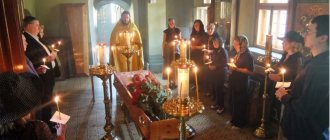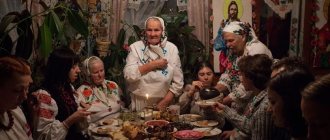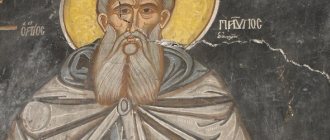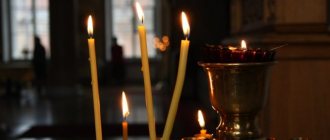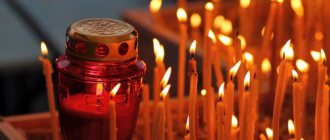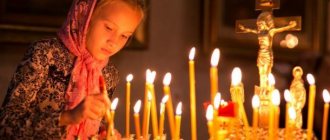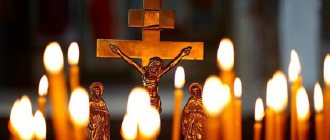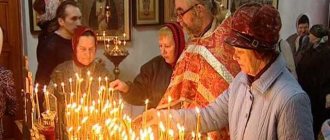In the bustle of days, a person usually rarely thinks about death. As a result, when the time comes, we often do not know how to see off a loved one on their last journey.
This leads to the fact that the relatives of the deceased do not understand what needs to be done in order for his soul to find peace in another world.
In addition, there are still many superstitions that Orthodox Christians should not follow during funeral rites. Not everyone knows about this and understands the danger they pose for a believer.
In preparation for the funeral, the dying person is given communion and the “Canon of Prayerful Exodus of the Soul” is read over him.
An Orthodox Christian should not die without realizing the fact that his earthly life will soon end.
Many relatives of sick people who are about to die try, out of good intentions, to hide the truth from them. As you know, the road to hell is lined with good intentions. By doing this, such people only show their cowardice, giving their loved one an illusory hope of recovery.
Before death, an Orthodox Christian must confess and receive communion.
If they care about him, on the contrary, they must tell him the truth in order to have time to take care of the dying parting words, as well as call the priest to the dying man. The latter is done only with his consent.
It is prohibited to give communion to persons who are unconscious or unconscious, so the priest is invited in advance. Naturally, it will not be possible to hide the truth about imminent death in front of a dying person, and if you do not invite a priest, then he will die without repentance and communion.
Mosaic-composition-of-the-Eucharist-in-the-Church-of-the-Intercession-of-the-Blessed-Theotokos-in-Yasenevo-city. Moscow
By receiving communion, a person unites with the Divine. It is especially important to do this before heading to another world, because during Communion the body of Christ becomes our body and the Blood of Christ begins to flow in our veins.
Many priests note that a large number of even believers, when preparing a loved one for death, attach great importance to external attributes. This is not correct, since it is important not to bury a person “correctly,” but to prepare his death so that it is Christian.
The main goal of earthly preparations is for the human soul to appear before the Lord pure and sinless.
This can only be done at confession and by communion of the Holy Mysteries of Christ. Without this, the Orthodox funeral rite will lack full meaning.
Venetsianov A.G. Communion to the dying. 1839 In Russia, the ritual of giving communion to the dying has always been strictly observed.
As people who have experienced clinical death testify, when the soul is separated from the body, a person usually experiences some kind of mental anguish. Many confirm the fact that they are unclean spirits in terrible forms. Their terrible voices can also be heard.
In order to facilitate the transition of the human soul to eternity, a special prayer called “The Canon of Prayer for the Exodus of the Soul” is usually read over the dying person.
If external paraphernalia is important for loved ones, then they should know that holy water and antidoron can be given to a conscious person who is dying, subject to the requirements for confession and communion.
After death, the deceased is washed and the Psalms are read over him
In Orthodoxy, funerals take place on the third day. After the death of an Orthodox Christian, his body must be washed with warm water.
In this case, you need to read either the Trisagion or “Lord, have mercy”
Since the relatives of the deceased are already traumatized by his death, it is better for outsiders to perform this operation.
See also the article Why you can’t cry for a dead person in Orthodoxy
After the ablution of the deceased is completed, the reading of “Sequence on the exodus of the soul from the body” begins.
The order of all actions will be determined by the priest invited to the funeral service. In the same case, when he was able to arrive, prayers for the deceased are read by his relatives and friends.
Olga Kalashnikova. Novice (reading the Psalter). Not only relatives, but also those people who have received the blessing of the priest can read it next to the coffin of the deceased
Then they continue to read the Psalter. This must be done continuously before removing the body and if possible.
Unfortunately, in our time it is almost impossible to read for such a long time, so it is necessary to read the entire Psalter at the tomb at least once.
The hymn is read every day until 40 days have passed.
It is worth reading to the loved ones of the deceased themselves, since they can, at the same time, themselves receive consolation from the Lord.
If this cannot be done, it is necessary to ensure that the Psalms are read by those clergy who have the blessing of a priest to do so.
When the death of the body has occurred
When the soul has left the body, it is very important for relatives to be calm and peaceful if they want the best for the departed. For 40 days after leaving the body, the soul remains on Earth in the subtle body. She feels and sees everything, but cannot physically act. If a person has a very strong subtle body, then he can even perform physical actions, but this is very rare. Therefore, very often after actual death there is a feeling that the person is somewhere nearby.
During these 40 days, the person comes to those places and to those people to whom he was attached in physical life. Often they stay in their home and visit their loved ones. That is why for 40 days after death there is no need to throw away things, rearrange things, divide property, so as not to cause pain to the departing soul. It is important to close the mirrors, because the soul in the subtle body still associates itself with the body that has died for some time. But if she approaches the mirror, she will not see herself (the subtle body is invisible), and this can frighten her or even make her angry, put her in a panic, which will also prevent her from leaving the world calmly.
On the first day after death, the soul in the subtle body is usually next to the physical body, because most people have a very strong self-identification with the body. This is a huge shock to most souls. In many ancient traditions, it is customary to burn the body so that the soul can disidentify with it. Otherwise, she becomes attached to the dead body and is often unable to leave the world until the body is completely decomposed. This is why there is such eerie energy in cemeteries: very often souls live there in the bodies of ghosts, awaiting the complete destruction of the physical body. They are very unhappy, and it is very difficult for them mentally to live through this. The psyche is located in the subtle body, so ghosts are able to feel even more than people.
If you do not have any rigid beliefs, then it is better to use cremation to bury the body, and the ashes can be scattered over sacred rivers or buried near energetically pure places. If, however, you are forced, according to the beliefs of your relatives, to bury the body in the ground, then it is recommended to sprinkle the grave with water from sacred rivers and sprinkle a little dry cow dung or dust from holy places there. This will greatly ease the energy.
First day
What can we do for a soul that has just left the body?
You need to understand that the person in the subtle body experiences great horror. Our task is not to increase this horror, but to calm it down and read the sacred scriptures on how to live after death. This is the most important thing - to calm down. You will feel when your soul calms down. The energy in the room will immediately change, it will be easier and more free to breathe, and a feeling of light will appear.
You can quietly play a recording of the prayers of a true believer or holy person. This will give peace of mind. Remember: the personality can still hear and see you, so talk to it. Reassure her with your knowledge: tell her that you will do rituals and pray for her, support her on this path, that everything will be fine, the main thing is to remember God.
After some time, the soul will calm down, then you need to offer it food and water.
Thirst, hunger and many other feelings are actually in the subtle body, so those who have left the dense plane still want to eat and drink for some time. Those who have been involved in various mediumistic practices may have encountered this when souls who have not yet gone far ask to be fed.
I remember a time when I saw the ghost of some grandfather. He told me that his granddaughter - he said her name - should feed him, that he was very hungry. He asked for rice or stew. I wrote to this girl, and she replied that her grandfather did not die, that he lived very far away. When she called him, it turned out that he had died the other day...
Cook rice (this is one of the best dishes for the departed) and prepare clean water, offer it all to God in front of the icon, and then in a separate plate offer it to the deceased to accept (through a photograph). Read more about this practice >>
Forty days
The following days are usually funerals. I repeat: you need to remain calm and peaceful. There is no need for any tragic speeches, play your favorite music for him and get drunk. This not only binds the person to the material world, but also worsens his condition.
The Vedas say that any sinful actions at the time of funeral rites aggravate the situation of the deceased.
Therefore, if all your loved ones drink alcohol, eat meat and are sad, then the departing soul takes on all this. That's what "help" is, isn't it?
It is especially important to maintain vegetarianism at funerals, because if some animal is eaten in honor of the deceased, then this energy passes to him, and he can even incarnate in the next life in the body of such an animal. Therefore, let there be as much consecrated vegetarian food on the funeral table as possible. The more consecrated food they eat, the greater the benefit for the one leaving.
From the day of death to the ninth day, it is very auspicious to offer consecrated food to photographs of the deceased every day. You can also read sacred scriptures that prepare him for the path to other spheres, perform fasting or austerities for this person and give the fruits to him. All this improves pious karma and helps to escape into bright worlds.
In Sanskrit, the son is called “putra”, and the daughter is called “putri”, which literally translates as “liberator from the shackles of hell.” And this is no coincidence: descendants can pull their ancestors out of hell at any stage of their stay there. This happens through purification of the karma of the family and pious deeds.
When we free our ancestors and relatives from the lower worlds, they give us their blessings. The family begins to flourish.
Therefore, ancient cultures always cared about the souls of their ancestors. We can do this too.
For 40 days the soul on earth remembers its lessons, realizes its mistakes, important understandings and realizations come to it. Therefore, the more spiritual energy her relatives have, the deeper and brighter her realizations will be.
At an even deeper sacred level, the first 40 days the spirit goes to the God of death, or to Purgatory, where its fate will be decided in connection with how it lived its life. And on this road he sees his mistakes and sins. A lot depends on the help of relatives: they can greatly ease his karma with their offerings and make this path easy and calm. That is why during the first 40 days you need to pray especially hard for your loved one.
Fate of the Soul
On the 41st day the verdict is rendered.
And this day is also very important. Now you need to make a serious donation, feed a large number of people well with consecrated food, distribute alms, plant trees, help the clergy, maintain serious asceticism or dry fasting in his honor, contribute to the construction of temples and holding spiritual meetings. This will improve his pious karma, because there we pay with the power of our piety.
“We will try, as much as possible, to help the departed: instead of tears, instead of sobs, instead of magnificent tombs - with our prayers, alms and offerings for them, so that in this way both they and we will receive the promised benefits,” writes St. John Chrysostom.
On the 41st day, the further fate of the soul, its next incarnation is determined based on what he has done in life and the supply of good karma.
After the 41st day, many souls get new incarnations, so you can start sorting out their things, emptying their rooms, etc.
But even after incarnation in another body, the energetic connection with relatives remains and influences us, therefore, no matter how much time has passed since the departure of relatives, it is never too late to start helping them through food offerings and prayers.
I quote my mentor: “A woman plays a special role in offering food to deceased relatives. The connection between deceased people and their descendants remains for a very long time. And the quality of life on subtle planets directly depends on the qualities of the descendants living in this world. If the descendants are sinful, then the ancestors can go to hell for failing to raise worthy offspring. The energetic connection does not disappear even when the ancestors have incarnated in new bodies. This connection remains, and the woman needs to organize the men to offer to the dead. The dead do not need gross physical food: they need the subtle component of these offerings. The culture of China and Korea is very wise. They take care of their ancestors and make large offerings throughout their lives. In India, blessed food is offered to the deceased every day. Consecrated food helps one live on the subtle planets and even pass by the hell that was intended for it.”
Rituals can be done with the whole family or individually; in any case, they will have power.
Rituals for the benefit of departed souls
I will summarize and list all the actions that are beneficial to perform after the soul leaves the body.
- Offer blessed food and water.
- Pray for this soul.
- Every time the deceased “comes” to your mind, read a prayer or mantra in his honor.
- To plant trees.
- Feed people consecrated food as a memorial service.
- Donate to priests and for the development of spirituality.
- Keep asceticism or fasting.
- Send light and love to this soul.
- Read the Bible / 9th chapter of Bhagavad Gita / Tibetan Book of the Dead.
- Include a recording of the voice of a holy person repeating mantras or prayers.
- Stay calm and grateful.
- Avoid eating meat, fish, eggs and alcohol.
- It is very auspicious to feed cows on behalf of the deceased.
- Cutting off one's hair is considered severe asceticism.
All this can be done not only for deceased adults, but also for suicides and aborted children - they are also full members of the clan.
It is necessary to preserve the culture of funeral rituals: a lot depends on it not only in the future life of our relative, but also in the life of our family and our children. Women hold this well-being in their hands. Control it, become a light in your family!
Clothes for the deceased to be placed in the coffin are chosen at the discretion of the relatives
Before placing the body of the deceased in a coffin, it, as well as the coffin itself, is sprinkled with holy water. In addition, the coffin is also sprinkled inside and outside, and incense is burned. This is not necessarily done by a priest, but by any Christian.
When choosing clothes for burial, the relatives of the deceased should be guided by their preferences. In this case, it is necessary to take into account the worldly status of the deceased. For example, military personnel and special services personnel must be laid in the coffin in their uniform.
Laymen are usually placed in it in civilian dress. When choosing clothes, preference is usually given to those clothes that fit comfortably on the body of the deceased.
Dead man's clothing for men
When choosing it, you must give preference to classic, strict things that can easily be put on the deceased.
Very often relatives ask the question: what is needed for a woman’s funeral? Here the same requirements are presented to deceased men. At the same time, the requirement that women's clothing for the deceased must be modest and appropriate for the season must be observed.
In any case, dresses with a deep neckline, with inscriptions, decorations or any designs are prohibited.
Traditionally in Orthodoxy, the deceased is covered with a shroud or church veil. It is a cloth that is placed on the body. Usually the shroud is purchased at the temple. It is mandatory for the deceased to wear a pectoral cross.
In the case where the baptismal cross has been preserved, they put it on. A corolla is placed on the forehead of the deceased - a paper ribbon with an image of the image of the Savior, the Mother of God and John the Baptist printed on it.
Burial of Christ. Karl Heinrich Bloch. The Orthodox burial rite has many elements symbolizing the burial of Christ
There are rules according to which it is necessary to fold the hands of the deceased. They are placed on the chest, with the right hand placed on top of the left. A funeral cross or a small icon is placed in the left hand. An icon is placed on the chest. Men correspond to the Savior, women - the image of the Mother of God.
Funeral procession
As customs say, if a funeral procession passes by your house, you cannot have anyone sleeping in the house. They say that a dead person can drag a sleeping person with him. You can’t look out the window at the procession; it’s better to close the curtains and be in silence. You cannot cross the path of a funeral procession. It is believed that if the deceased was sick, the person who crossed the road can take his illness for himself. The day of the funeral is very difficult and painful, but it must be done correctly, no matter what. It is important to follow all the rules, hold a memorial dinner and pay tribute to the deceased. Some people firmly believe in these signs, while others consider them superstition. You are free to decide for yourself.
Read: This is why Tibetan Mahatmas and all beautiful women drink hot water in the morning
(No ratings yet)
Similar materials: loved one, last, life, don’t do, you can’t, bad, seeing off, path, burial, person, this
“Funeral services in absentia” are prohibited, and music at an Orthodox funeral is inappropriate
The coffin is placed in compliance with different traditions, since no rules have been established for this. Usually it is installed according to tradition, placing the deceased, facing the east or towards the icons.
At the same time, it is necessary to avoid pagan superstitions and not light a candle in front of a photograph of the deceased or place a glass of water in his room.
In the room where the coffin stands, candles and lamps must be lit in front of the icons.
Before taking the deceased out of his house, it is advisable that his relatives invite a priest to perform a memorial service for him. The priest can also accompany the coffin to the temple, where the funeral service will take place.
The funeral service must take place in a church; funeral services in absentia are prohibited and can only be permitted in exceptional cases. Such an exception could be, for example, the absence of a temple in a particular area.
Contrary to existing superstitions, the coffin should be carried by relatives and close friends of the deceased. It is worth noting separately that a priest should under no circumstances carry a layman’s coffin. No exception is made here.
Transfer of the relics of St. Nicholas from Myra in Lycia to Baria
Even in ancient times, the coffin of the deceased had to be carried by his relatives and friends, which is depicted on the fresco.
When an Orthodox person has died, there is no need to invite an orchestra for his burial, since this does not correspond to church canons. When the soul is separated from the body, it is necessary to pray for it, but music distracts from this. For the same reason, you cannot talk loudly or cry during a funeral.
Directly at the cemetery, saying goodbye to the deceased, you will need to kiss the aureole on his forehead, as well as the icon lying in the coffin. During the funeral ceremony, you do not need to talk a lot or loudly. It is enough to say a few words about who the deceased was to you, to ask him for forgiveness for all the insults you caused him.
In addition, it is also necessary to forgive him for his offenses caused to you.
The coffin with the body is lowered into the grave with its head facing the East. This means that we are awaiting the Second Coming of Christ. The deceased goes from the West, that is, from the end of life to the East - eternity.
The cross in Orthodoxy is a symbol of salvation, so it is installed on the grave mound at the feet of the deceased
An eight-pointed cross is installed above the grave mound as a symbol of salvation. It can be made of any material and must have the correct shape. Place the cross at the feet of the deceased.
The crucifix should be directed towards his face, so that when he rises from the grave, he can look at the sign of Christ’s victory over the devil. The same rule applies to any monuments with crosses placed on them.
Returning from the funeral
Upon returning home, you need to touch the stove. This sign arose a long time ago and is due to the fact that the stove identifies the element of fire. Elder people say that by touching the stove, you can burn away all the bad omens. If there is no stove or something similar, you need to light a candle, it will also help burn away all the bad things.
The burial of a priest is longer and more solemn than that of a lay person.
In Orthodoxy, priests are buried according to special rules. The main difference between this and the burial of the laity is that the rite is more complex and solemn. So, for example, five readings from the Apostle and five from the Gospel are read, and troparia are sung.
The buried priest dresses in his usual clothes. Next he is dressed in priestly attire.
Farewell to Alexy II takes place in the Cathedral of Christ the Savior, the funeral will take place in the Epiphany (Elokhovsky) Cathedral. Covered with air - an embroidered scarf, the face of the patriarch indicates that during his life he consecrated gifts and partook of the Holy Mysteries of God
Many laity have a question: why are priests buried with their faces covered? Indeed, the face of the deceased is covered with air, that is, with an embroidered scarf, which is usually used to cover the Holy Gifts during the liturgy.
A closed face means that now the clergyman stands before the face of the Lord and is closed to the world. He descends into the ground with the deceased and means that during his lifetime he was the performer of the Mysteries of God. The Gospel and the Cross are also placed in the hands of the deceased.
During the burial of a priest, the coffin with his body is carried three times around the temple in which he served. There is also a special chime. The burial rite for deacons, priests and bishops is different. This is worth remembering when watching it from the outside.
The dead are remembered not with vodka, but with prayer
Funeral rites in Orthodoxy usually end with a funeral meal. This is an ancient custom and the church does not interfere with it. Before starting such a meal, it is necessary to serve a lithium or a short rite of requiem. A layman can do this too.
If no one knows how to do this, I read the 90th Psalm or the Lord’s Prayer.
Consecration of kuitia (koliwa). Kutia is the main dish on the funeral table. It symbolizes the resurrection and joy of the righteous in Paradise
At a wake, the first dish is kutia or kolivo. It consists of boiled millet or rice grains with honey or raisins. By eating this dish, a person comes into contact with the departed soul, and the funeral meal itself is a symbol of such prayer.
The grains here are a symbol of Sunday, and the honey is the sweetness that the righteous enjoy in the Kingdom of God.
Kutya must be consecrated.
Unfortunately, many people remember the dead with alcohol. This cannot be done, since wine is a symbol of earthly joy. Funerals are an occasion for intense prayer. The deceased may suffer greatly in the afterlife. Therefore, it is necessary to pray for him, and not get drunk.
In addition, you should not “remember” a person with a funeral pile and bread. This is a pagan custom, not a Christian one, therefore it is unacceptable in the life of an Orthodox Christian.
An Orthodox Christian should not observe pagan customs and pour vodka on a grave mound.
Unfortunately, the Russian people, having adopted Orthodoxy, have still not eliminated pagan customs from everyday life. It is still customary for us to throw fir branches in front of the coffin, since supposedly the soul of the deceased will be afraid of their thorniness and will not come back.
They also often hang mirrors in the house where the deceased lived, or they declare that it is necessary to place special icons in the coffin with the body of the deceased, playing the role of amulets against evil forces.
A hung mirror in the house of a deceased person. This is an old superstition, which the Orthodox Church has been fighting for a long time, since one should not rely on signs when fighting wickedness, but on our Lord Jesus Christ
These outdated customs should not be performed by a believer, for it is said:
“I do not want to leave you, brothers, in ignorance about the dead, so that you do not grieve like others who have no hope. For if we believe that Jesus died and rose again, then God will bring with Him those who sleep in Jesus.”
(1 Thess. 4:13–14)
Thus, you don’t need to worry about where to put the icon from the coffin or ask your friends what to say at the funeral. All this needs to be learned from the priest, as befits a good Christian.
If you need to show in public that in a particular house they are mourning a deceased relative, an ordinary candle near the icon will indicate mourning for him.
It is always necessary to remember that you need to worry about the soul of the deceased, and not about the pomp of his burial. It is appropriate to pray for him, and not to erect a magnificent monument. In Orthodoxy, the dead are commemorated during the celebration of the Eucharist on the 3rd, 9th and 40th days. Further commemoration is carried out on church holidays, for example, on Radonitsa.
By leaving a comment, you accept the user agreement
Translation into Russian or English of the lyrics of the song - The last journey of the artist Shot:
Came the voice of a friend, we're going today in the club, At nine o'clock, there will be plus our new people. Mom will not let go, you do not like small, Everything, come on, we are waiting for you at twenty, right at the entrance. So every weekend and only home in the morning, Familiar new footy, but like with kindness, Free treat, asking nothing in return, And if you fall, in theory, help to get up off his knees. Mom, you do not understand, they are great guys, And my friends do not play in the Barbie And stop talking to me, which is good, what is bad, How do you tired, it was necessary to die at birth. I collect things, leave the house, Where to live, I find, do not worry, I have many friends, Do not come back, good-bye, I'm serious, Mom, trust, The door slammed shut and only emptiness remained with her...
Everything is in your hands, you know that, but still, You choose the way, instead of that expensive, And you remember everything, but it is a pity not to return, The remaining memory and the way his last journey...
Flying wind days on the calendar Spirit is not falling, thanks to your friends Found a job, even two, girl boy, During the day it is in a cafe waiter, night there, but sex. And alcohol is no longer interested in her, After all, there are things more pleasant, and much stronger, Today, white powder and spoon over the fire, Tomorrow in question and do not care, because we live on. Looked in the mirror holding a trembling hands, Remembering native home, the desire to pull over to the mother. So quietly flew three years, Basements, streets, dirt, death, left a bit. Slowly moving his feet, found its threshold, To gather his thoughts and smoothly hand rang the bell, The mother opened the door, and the daughter she whispered softly, I ask pardon, and the body as if a stone has fallen...
Well, what have you done, my daughter, look, Just be patient, I'll try to call three zero. But she took my hand and said my mother stand, Give one minute, I now want to be with you. I saw people, but not you over the years, I hated myself for all their work, I wanted to call to ask my mother, well, how are you, I knew it, my mother knew you were waiting for this. I am now nineteen only on documents And in my heart for a long time old , like the old films , I know you will forgive , but I just do not forgive Himself for the words , Mom , I'm sorry , because I love you . And you raise a daughter, his home, mother, But not one that would be a man drug addict, Heart stopped at nine o'clock Saturday The remaining memory and wasted those years …
If you find a typo in the text or translation of the song The Last Path, please report it in the comments.
